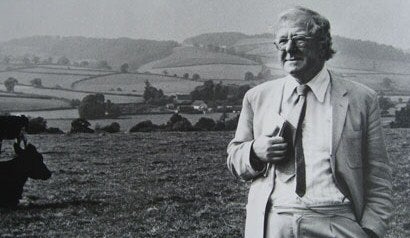Book of a Lifetime: The Making of the English Landscape by WG Hoskins
From The Independent archive: Penelope Lively on a book that changed the way she saw the world

I did not discover The Making of the English Landscape until the early 1960s, though WG Hoskins had published his seminal book in 1955. I can remember avidly reading, and then the thrill of seeing what I was reading made manifest all around me where we then lived, in Oxfordshire: the ridge and furrow of medieval open fields, the lumps and bumps of deserted medieval villages, the grassy swathe of an old drove road. I put on my boots, as recommended by the robustly open-air Hoskins, and walked. I acquired Ordnance Survey maps, and recognised more and more of this presence of the past. The landscape began to look different: it spoke.
At that point, I was just interested in these magical revelations, seeking out Roman villa sites, investigating the layout of villages. I have remained intrigued by the mysterious codes of landscape ever since, but the message of the book went further still, serving as an analogy for memory itself, and the way in which it is not linear but delivers innumerable co-existing fragments – childhood and yesterday all jumbled up in the head.
Landscape works in the same way, with everything juxtaposed, the Roman road cutting through medieval fields, ancient footpaths and boundaries determining the street plan of a modern town. Hoskins’s scholarly pursuit of why the world looks the way it does made me think about the sense in which people are a product of all that has happened to them, and want to explore this in fiction.
Much later, I made a landscape historian the central figure in The Photograph. He in no way resembles the great and good WG Hoskins, but he was a joy to create, because I felt I knew something about what he would be doing, and perhaps how he would think. Landscape is now looked at with more understanding and by more people than in the 1950s, largely thanks to television.
Hoskins himself did a television series in the Seventies, and today programmes that zoom around the country, homing in and explaining, are staples of both the BBC and Channel 4. Archaeology has thrived on television attention, to the extent that apparently university departments are over-subscribed, though sometimes by applicants whose ambition is to be archaeology presenters. And for me, archaeology has played a theme tune in several novels.
I can see how The Making of the English Landscape not only turned scenery into a complex coded reference system, but prompted an approach to writing fiction. It made me think even more about the operation of memory, the curious erratic assortment that each of us carries around, the evidence of who we are and what happened to us. The landscape of the mind is as fortuitous and as opaque as the landscape in which we move around – tempting material for a novelist.



Join our commenting forum
Join thought-provoking conversations, follow other Independent readers and see their replies
Comments